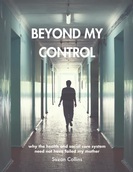Families urged to speak out about fears over older relatives’ care
 The book ‘Beyond My Control’ explores the process of events which led to the mother of author Suzan Collins dying in hospital, despite only being admitted due to two fractures in her leg.
The book ‘Beyond My Control’ explores the process of events which led to the mother of author Suzan Collins dying in hospital, despite only being admitted due to two fractures in her leg.
Suzan Collins has worked in the social care sector for more than 30 years. With her high level of knowledge on safeguarding and good practice in the care sector, Ms Collins has written ‘Beyond My Control –Why the health and social care system need not have failed my mother’ to share her personal experience of fighting to improve the care received by her mum. At the same time the book gives readers practical advice and recommendations on what to do if they find themselves in a similar situation.
Ms Collins lets the reader know what rights they have as a relative and what person-centred values all residents should have whilst receiving care.
Ms Collins said: “I wrote the book to tell the story of what happened. I started writing notes as it became clear that there was a problem, firstly at the nursing home and then the hospital.
“I couldn’t believe these things were happening and that the complaints procedure which we tell others to follow didn’t work.”
The story reveals how her mum went from living in a nursing home to eventually passing away in hospital due to blood poisoning, having developed the worst type of pressure ulcers despite entering hospital with only a moderate type.
The observations made in the book reflect on many good memories of her mum and tracks the process of negative events which took place during her time in hospital.
Communication problems
Whilst living in a nursing home, her mum was involved in an incident as she was being moved using a hoist which had not been fitted correctly. In her introduction, Ms Collins explains: “I hope this book will raise awareness of standards and the importance of not accepting low ones. We need to do more to ensure vulnerable people receive the respect and care they deserve.”
The problems for the family started when there was a discrepancy between what they were being told about events concerning their mother and what had really happened in the hospital. After her mum’s death Suzan was given the medical records and again found discrepancies between the account on medical records from the hospital and, eventually, the care notes from the nursing home.
Ms Collins said a lack of communication between services, wards and professionals caused meetings to be missed and key information to be left uncompleted on her mother’s documentation.
The book shows the pressures experienced by a family and provides the reader with an insight into how relatives can feel when they see older family members experience poor care.
Advice for others
Provided at the end of many chapters are reference points and advice for people who feel they have experienced a low standard of care.
Advice is also given about the emotional and physical way loss, guilt and stress can affect a relative, offering tips and coping mechanisms.
Ms Collins said: “I became aware of others concerned about their loved ones but not knowing they could complain or how to do it.” Explaining the advice section found throughout the book, Ms Collins said: “It enables people to know what to do if they have any concerns.
Many have contacted me saying that the book has helped them when they’ve had concerns over the poor care of their relative. Things are changing, albeit slowly, but we must continue to speak up. If we don’t tell people what they’re doing wrong, how can they put it right?”
Unresolved issues
During the process of uncovering why her mother’s care deteriorated while in hospital, Ms Collins met with the hospital’s director of nursing, the ward nurse and complaints manager but failed to receive the level of apology or acceptance of fault to settle her concerns. 
As part of trying to find out what had happened and why, communication with the safeguarding team leaders took place as well as communication with the associate director of the nursing home and the inspector of the Commission of Social Care Inspection, which has since become the Care Quality Commission.
An extra loss
As well as describing her fight to challenge the actions of staff members towards her family, Ms Collins went through another loss when her aunt became suddenly ill and died, despite receiving high quality care in a hospital local to her.
The main drive behind the story is the author’s goal to receive a public apology for the treatment of her mum which she witnessed in both the nursing home and hospital.
She said: “I wanted our case to go to court. I needed what had happened to be discussed in a courtroom so everyone could hear about the shocking things that had happened to my mother, and how she had been let down by those who had had a professional duty to protect her.
“I wanted the opportunity to ask questions. I also wanted a public apology, not a private sorry in a confidential letter to me.”
Eventually choosing not to go to court, Suzan Collins has continued her commitment to improving standards of care. As well as writing the book, she believes improving care is down to management and ensuring that the staff receive regular 1-1 supervision sessions where any concerns can be raised and discussed.
Ms Collins wants anyone placed in a similar situation as her to act on things they feel are not correct to improve and boost the care sector.
She said: “I would advise them to firstly discuss it with the senior on the ward or in the care home and if they’re not getting anywhere to ask for a copy of their complaints procedure and follow it. If they do not feel confident in doing this they can contact the Care Quality Commission or their local Health Watch office or pop into their local Age UK shop.”
‘Beyond My Control’ has been shortlisted for ‘The people’s book prize’ which recognises and celebrates authors and is voted for entirely by the general public, with voting taking place now until 30 November 2014.
To vote for the book visit: http://www.peoplesbookprize.com/section.php?id=2
Latest Features News
 28-Nov-19
2019 Election: Labour pledges £10.8 bn for free personal care while Boris Johnson sidelines social care
28-Nov-19
2019 Election: Labour pledges £10.8 bn for free personal care while Boris Johnson sidelines social care
 18-Oct-19
Podcast: Wendy Mitchell and dementia: 'My biggest fear is not knowing who my daughters are'
18-Oct-19
Podcast: Wendy Mitchell and dementia: 'My biggest fear is not knowing who my daughters are'
 30-Sep-19
World's oldest diver aged 96 says 'never accept the fact you are getting old'
30-Sep-19
World's oldest diver aged 96 says 'never accept the fact you are getting old'
 27-Sep-19
Exclusive: Care minister backs care workers' call for time off to grieve and attend funerals
27-Sep-19
Exclusive: Care minister backs care workers' call for time off to grieve and attend funerals
 20-Sep-19
Podcast: Gyles Brandreth urges care workers to learn poetry with elderly
20-Sep-19
Podcast: Gyles Brandreth urges care workers to learn poetry with elderly